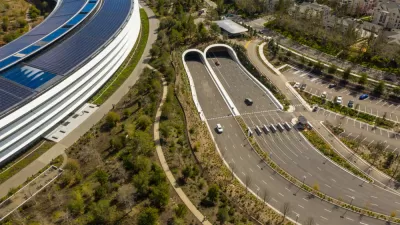Facebook joins as Google in the $1 billion club, though this club plans to spend that money on housing programs to help alleviate the exploding cost of housing in the state of California.

"Facebook on Tuesday committed $1 billion to tackle affordable housing shortages in the Bay Area and around the country," reports Marisa Kendall.
The move cams as a surprise, according to Kendall, but it places the company in very small company among other tech giants paying exorbitant sums of money to help alleviate the state's housing affordability crisis—a crisis that some in the state have blamed on tech companies like Facebook. Google made a similar pledge to spend $1 billion on housing in June 2019. Previously, Facebook had pledged $20 million to help launch a fund that supports housing and jobs in Menlo Park and East Palo Alto.
"Over the next 10 years, that money will help create up to 20,000 homes where teachers, nurses and other essential workers can live closer to the communities they serve, according to an announcement on Facebook’s website. Facebook also unveiled a new partnership with Gov. Gavin Newsom’s administration to build mixed-income homes on excess state-owned land," writes Kendall.
FULL STORY: Facebook pledges $1 billion to fight housing crisis in California and beyond

Planetizen Federal Action Tracker
A weekly monitor of how Trump’s orders and actions are impacting planners and planning in America.

Maui's Vacation Rental Debate Turns Ugly
Verbal attacks, misinformation campaigns and fistfights plague a high-stakes debate to convert thousands of vacation rentals into long-term housing.

San Francisco Suspends Traffic Calming Amidst Record Deaths
Citing “a challenging fiscal landscape,” the city will cease the program on the heels of 42 traffic deaths, including 24 pedestrians.

Amtrak Rolls Out New Orleans to Alabama “Mardi Gras” Train
The new service will operate morning and evening departures between Mobile and New Orleans.

The Subversive Car-Free Guide to Trump's Great American Road Trip
Car-free ways to access Chicagoland’s best tourist attractions.

San Antonio and Austin are Fusing Into one Massive Megaregion
The region spanning the two central Texas cities is growing fast, posing challenges for local infrastructure and water supplies.
Urban Design for Planners 1: Software Tools
This six-course series explores essential urban design concepts using open source software and equips planners with the tools they need to participate fully in the urban design process.
Planning for Universal Design
Learn the tools for implementing Universal Design in planning regulations.
Heyer Gruel & Associates PA
JM Goldson LLC
Custer County Colorado
City of Camden Redevelopment Agency
City of Astoria
Transportation Research & Education Center (TREC) at Portland State University
Jefferson Parish Government
Camden Redevelopment Agency
City of Claremont





























